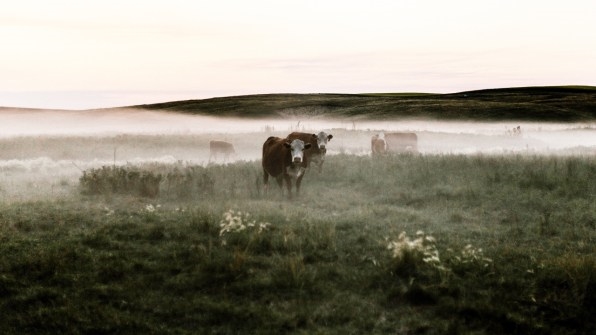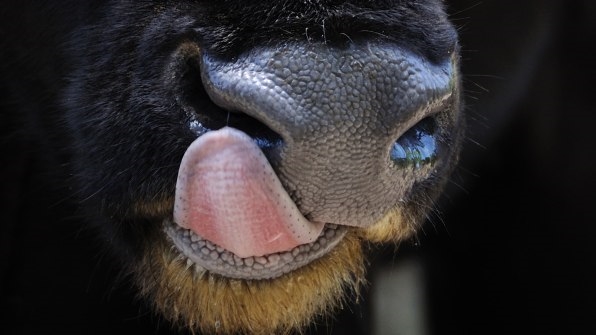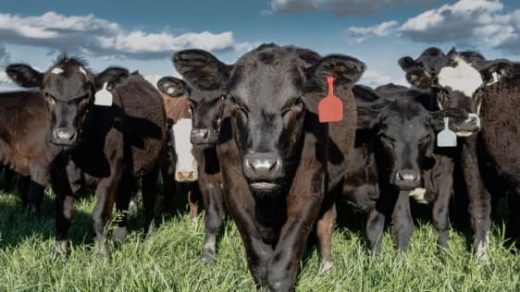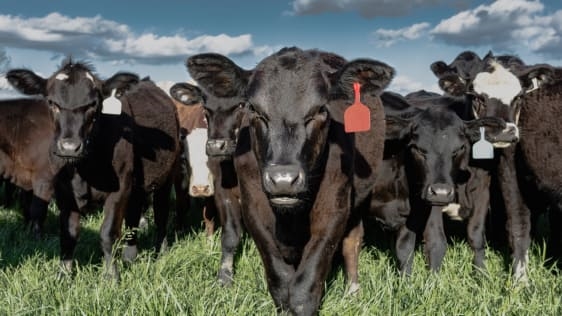This New Probiotic Makes Cow Burps Less Damaging To The Climate
In 2016, the California legislature introduced the the Short-Lived Climate Pollutant Reduction Act, which was designed to reduce carbon emissions by 50% by 2030, and methane levels by 40% by the same year. Among the many requirements, the bill mandates that dairies and beef farms reduce cow-derived methane emissions–in the form of belching, flatulence, and manure–by 75% by 2030.
California’s dairy industry is the largest of the 50 states; it falls behind only Texas and Iowa for beef and livestock product output. Over 5 million cows support both of those industries statewide.
Needless to say, dairy and beef farmers were not pleased. Rob Vandenheuvel, general manager of the California-based Milk Producers Council, told CNBC that because farmers could skirt the consequences of the law by moving the cows elsewhere, “all we will have lost is jobs.”

He has a point: The methane cows emit in another state still make it into the atmosphere. It’s clear that the long-term solution to curbing cattle-derived methane, which accounts for around 15% of global greenhouse gas emissions, is to roll back our cultural dependence on meat and dairy (perhaps switching to plant-based alternatives like Ripple Foods’ pea-based milk and the Impossible Burger), and dramatically scale down large-scale farms. But in the meantime, a new product aims to act as stopgap.
Mootral, a new natural feed supplement from Zaluvida, a biotech company that tackles health challenges ranging from antibiotic resistance to livestock emissions, claims to instantly reduce cow methane emissions by at least 30%. The powdery supplement, which is compressed into pellets and mixed into cattle feed streams, is made of two basic ingredients, garlic and citrus extracts (the exact formula is proprietary). Zaluvida’s team of researchers have found that the two compounds combined improve cows’ ability to digest without emitting excess methane in the process. While cow farts are often blamed for the bulk of their methane emissions, it’s really their burps that are the culprits–and that is what Mootral is most effective in neutralizing.
Which is not to say, necessarily, that Mootral curbs the volume of cow burps, but rather that it restricts the amount of methane the cow releases in the process. The supplement assists the cow’s stomach in processing food by discouraging the growth of the bad bacteria that produces methane, and promoting good bacteria that aids digestion (essentially, it’s like a cow probiotic). To test the results, researchers use a feeding station called GreenFeed, which is an open food tub equipped with a ventilation hood overhead. As the cows eat and and process the food (they burp roughly once per minute), the ventilation hood intakes emissions from the cows and analyzes it for methane content.

As a stopgap method, Mootral (a portmanteau of “moo” and “neutral”) “is a solution that acknowledges the reality of where we are today,” says Trista Van Tine, global marketing director for the product. “We want to help farmers make more money, and we want to help the environment.” The actual amount of supplement needed to deliver the 30% methane-reduction is very small; Van Tine says that per cow per day, farmers will only need around 10 to 17 grams. Mootral is still in the early stages–it just launched a pilot project at UC Davis–but once the product scales up, Van Tine says that it should cost farmers no more than $60 per cow per year to deploy.
Zaluvida is in talks with farmers, policymakers, and governments to devise a way to work Mootral into existing emissions-reductions framework. Using Mootral could grant farmers carbon credits (or CowCredits, as the company is proposing they be called) that could work in current cap-and-trade markets, for instance, and a new “Climate-Smart Cow” designation on beef and dairy products could justify a slight hike in prices.
While Mootral’s effects are potentially very positive–Zaluvida estimates that if 40% of the world’s 1.5 billion cows are fed the supplement, the resulting emissions reductions would be equivalent to removing 200 million cars from the road–it’s still crucial that research and policy continue to direct us away from a dependence on beef. By 2050, there could be as many as 2.5 billion cows on the planet. Around 30% of the world’s land is used for raising livestock (that doesn’t even account for feed production, which takes up around one-third of total arable land). With the human population expected to grow by 2.5 billion people by 2050, we can’t afford to relegate so much land to the inherently unsustainable models of dairy and livestock agriculture.
Mootral is a potentially promising Band-Aid for a gaping wound. But the novelty of it shouldn’t distract us from the need for a much broader, systemic shift away from beef and dairy, and toward more sustainable, less environmentally destructive means of feeding ourselves.
Fast Company , Read Full Story
(26)



